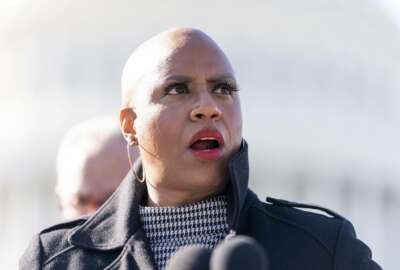

A Cybersecurity and Infrastructure Security Agency recruitment initiative represents a growing trend for agencies trying to boost diversity in hiring practices.
Many agencies benefit from recruiting more early-career workers to both address the challenge of a growing retirement-eligible population, as well as find new ways to solve problems.
With a different perspective, early-career workers become even more important to the future of the federal workforce, said Pam Coleman, the Office of Management and Budget’s associate director for performance and personnel management.
“It’s OK to take those risks when you’re a digital native,” Coleman said at an Alliance for Digital Innovation event on May 24. “You do something, you try it, you look at it, you iterate, you come back to it, you do it again, you figure out a different way [and] you figure out a better way.”
To support new solutions to problems, as well as enhance the federal recruitment pipeline overall, the President Management Agenda’s first strategy — strengthening and empowering the federal workforce — is right now heavily focused on hiring early-career talent and interns.
“We’re coordinating with a lot of interested groups to better understand the current data, identify opportunities to increase the number of interns, transition more interns to full-time employees and have more paid interns,” Coleman said.
But early-career employees are only one piece of the puzzle to improve federal recruitment. Incorporating diversity, equity, inclusion and accessibility can further benefit agencies in changing the way they address new challenges. At the Cybersecurity and Infrastructure Security Agency, leaders are working on a governmentwide effort to hire more diverse technologists.
“We are looking at the next generation of workforce, what that looks like, how we can incorporate diversity and accessibility to the information and training that we have and really share that more broadly,” said Toni Benson, CISA’s cyber education and training lead, at a May 24 federal recruitment panel. “If we can train the federal government, we can also help train the next generation of workforce.”
As part of efforts to enhance DEIA in hiring, Benson said a $2 million initiative with CyberWarrior and NPower is helping CISA strengthen equitable recruitment programs. The contract, which the agency awarded last October, focuses on recruiting a more diverse cybersecurity program by bringing talent from underemployed, underrepresented communities to cybersecurity positions.
“They’re looking at it very holistically — from a training aspect, to an apprenticeship opportunity, to employment,” Benson said. “It was a cooperative agreement, so that means the government can’t be the sole beneficiary of that. We’re really looking at how we can help cultivate talent, not necessarily just to benefit the federal government, but to benefit the whole ecosystem.”
CISA’s initiative to support students at Historically Black Colleges and Universities (HBCUs) aims to garner interest in cybersecurity for underserved communities. But Benson said the effort doesn’t end there.
“You have to be able to help cultivate it at the early part, but then you have to be able to actually get them jobs when it’s all said and done,” Benson said. “It’s not enough just to start an initiative. How does it feed all the way into the workforce?”
To improve federal recruitment strategies, OMB emphasizes collaboration across agencies. For example, the fiscal 2023 budget request plans to build on talent teams, first introduced in the 2022 enacted budget, which share competitive hiring announcements with other agencies.
“This will help decrease the number of public announcements without any selections and increase applicant placement, leading to an improved applicant experience and ensuring agency hiring managers can select the talent they need,” the 2023 budget request’s analytical perspectives section stated.
As another way to collaborate on recruitment, several agencies are piloting the subject matter expert qualification assessment (SMEQA) program. Subject matter experts can help hiring managers find the right people for technical roles, to find more innovative ways to solve problems, Coleman said. OMB has worked with agencies on the SMEQA program to hire, for instance, data scientists and customer experience strategists.
“The U.S. Digital Service, OMB, [the Office of Personnel Management] and the Chief Data Officer Council partnered on a single shared data scientist announcement that resulted in nearly 50 high-level and highly sought-after data scientists accepting permanent job placements in more than a dozen federal agencies,” the budget request stated.
Because of early successes, agencies are now running several more pilots focused more broadly on hiring for technical jobs, as well as using the program to hire for multiple agencies at a time.
“Not only are these agencies using SMEQA, but they’re committed to sharing these extra applicants with other agencies. This is about, ‘how do we help the whole system by using a process that works, and so we don’t have to reinvent every time?’” Coleman said.
Adding to current and previous initiatives, and borrowing other ideas, can help agencies make progress on hiring and retaining workers.
“We’re looking to build on lessons that have already been learned. We don’t have to recreate the wheel,” Coleman said.
Copyright © 2024 Federal News Network. All rights reserved. This website is not intended for users located within the European Economic Area.
Drew Friedman is a workforce, pay and benefits reporter for Federal News Network.
Follow @dfriedmanWFED



